The other day I was asked whether I was happy that the US President was…
Europhile Left deluded if it thinks reform process will produce functional outcomes
A recent twitter exchange with some Europhiles who believe that it is better to wait for some, as yet unspecified, incremental reform process for the Eurozone rather than precipitate exit and the restoration of currency sovereignty was summed up for me by one of the tweets from Andrew Watt. In trying to defend the abandonment of sovereignty and make a case for continuing with the so-called reform dialogue, he wrote (October 27, 2017): “Unemployment in “periphery” was v hi before €. Fell rapidly. Then rose sharply, has now fallen somewhat. So picture very mixed.” I found that a deeply offensive claim to make and responded: “It is not a mixed picture at all. Youth unemployment has never been as high. Greek unemployment was never > 12%. Now > 20% indefinitely.” I also attached a graph (see over). I think this little exchange captures the essence of the delusion among many in the Left that we document in our new book – Reclaiming the State: A Progressive Vision of Sovereignty for a Post-Neoliberal World (Pluto Books, 2017). The Europhiles maintain a blind faith in what they claim to be a reform process, which when carried through will reduce some of the acknowledged shortcomings (I would say disastrously terminal design flaws). They don’t put any time dimension on this ‘process’ but claim it is an on-going dialogue and we should sit tight and wait for it to deliver. Apparently waiting for ‘pigs to fly’ is a better strategy than dealing with the basic problems that this failed system has created. I think otherwise. The human disaster that the Eurozone has created impacts daily on peoples’ lives. It is entrenching long-term costs where a whole generation of Europeans has been denied the chance to work. That will reverberate for the rest of their lives and create dysfunctional outcomes no matter what ‘reforms’ are introduced. The damage is already done and remedies are desperately needed now. The so-called ‘reforms’ to date have been pathetic (think: banking union) and do not redress the flawed design. And to put a finer point on it: Germany will never allow sufficient changes to be made to render the EMU a functioning and effective federation. The Europhile Left is deluded if it thinks otherwise.
The original tweet from Andrew Watt:
My response:
Some readers wrote to me asking me why I have started the graph in 1980 – was I hiding something. Well it was because I was on the road and didn’t have access to my full databases.
But I knew what the data prior to that also said.
So here is the OECD Economic Outlook data (from 1960 to 2016) for the Greek unemployment rate, which confirms the veracity of the tweet statement (at least as far as Greek unemployment goes).
The fact that the Greek unemployment averaged just 6.6 per cent prior to the crisis (from 1960 to 2008) and has averaged 20.9 per cent since then (2009-2016) and has been above 20 per cent since 2012 tells me that the policy structures in place have failed badly since the GFC.
That means – the austerity imposed under the Stability and Growth Pact, the lack of a federal fiscal capacity and the lack of a ‘federal sentiment’ which would have eased the way for generous funds transfers to Greece to allow it to restore domestic demand relatively quickly – was not forthcoming.
The following two graphs further summarise my position.
The first graph shows the evolution of youth unemployment rate (15-24 year olds) from the first-quarter 2000 (the inception of the Eurozone for the first entrants) to the June-quarter 2017 (using Eurostat data une_rt_q).
The term “Eurozone periphery” is taken to mean Greece, Spain, Portugal and Ireland, although Italy is sometimes included (in the rather lamentable PIIGS acronym).
What we see is steady youth unemployment rates in the ‘honeymoon’ period of the euro (before the first real test arrived in 2008) then a rapid rise in youth unemployment rates and elevated levels ever since.
The fact that Greece and Spain have endured youth unemployment rates above 40 per cent since the September-quarter 2009 (Spain) and the March-quarter 2011 (Greece) is one of the most shocking signs of a failed monetary system.
Both nations delivered youth unemployment rates above 50 per cent for extended periods. In the case of Greece, youth unemployment exceeded 50 per cent for 14 out of 17 quarters between the March-quarter 2012 to the March-quarter 2016.
I will come back to that point soon.
The second graph uses the same data to provide a different perspective – the change in the youth unemployment rate (15-24 year olds) from the March-quarter 2008 to the June-quarter 2017 – the crisis and its aftermath.
As you can, the Eurozone periphery nations have had dramatic increases in youth unemployment over this period and most Eurozone nations have experienced a rise.
If you then reflect on what this sort of data means, it becomes clear that the mismanagement of the Eurozone by Brussels/Frankfurt/Washington has created an intergenerational disaster.
The elevated levels of official unemployment is one problem. It has created an entrenched underclass.
Rates of poverty have risen substantially across Europe. Mass unemployment is a very powerful predictor of poverty. But then to overlay that with further austerity – cutting pensions, wages, income support schemes, in-kind transfers and the rest of the austerity targets – only exacerbates the loss of income.
The following graph shows the “Cumulative difference from 2008, in thousands” of “People at risk of poverty or social exclusion” as at 2016 (Eurostat t2020_50).
So there are now an 3.013 million people (29.9 per cent) in Italy in this class, 2.040 million (27.9 per cent) in Spain, 743 thousand (35.6 per cent) in Greece, 157 thousand (26 per cent) in Ireland. Portugal’s situation is largely unchanged over the period.
But, by any measure, that is not a mixed result for the peripheral nations. We are talking about a system that has generated rising poverty rates in advanced nations.
How can that be considered a mixed result?
When you compare the Eurozone Member States with the other European Union nations, the largest increases in poverty and social exclusion were all within the common currency nations.
But the depth of the crisis facing Eurozone Member States in terms of rising poverty is somewhat masked by the way the data is compiled by Eurostat.
Eurostat offer the following definition of being “At risk of poverty”:
At risk-of-poverty are persons with an equivalised disposable income below the risk-of-poverty threshold, which is set at 60% of the national median equivalised disposable income (after social transfers).
So it is not an absolute measure because it is influenced by movements in the median income.
What we learn is that the median income in many countries (most EMU nations) has fallen sharply since 2008.
Eurostat data (ilc_di02) shows Median equivalised net income for 2008 and 2016 was:
1. Greece – 8,133 euros a year (2008) to 5,112 euros a year (2016).
2. Ireland – 18,921 (2008) to 10,612 (2015).
3. Portugal – 6,253 (2008) to 6,420 (2016).
4. Spain – 10,387 (2008) to 9,385 (2016).
5. Italy 12,018 (2008) to 11167 (2016).
What this means in relation to the “At risk of poverty data” is that citizens in most of the periphery have become relatively and absolutely poorer.
And that effect is now entrenched and persistent.
Moreover (before I return to the youth issue), the ECB Economic Bulletin Issue 3 / 2017 published a special box – Assessing labour market slack – which showed that the official unemployment rate understates the degree of slack in the Eurozone.
They concluded that after 8 years of crisis:
… there may still be a high degree of underutilisation of labour – or labour market “slack” – over and above the level suggested by the unemployment rate.
Their argument is that “The unemployment rate is based on a rather narrow definition of labour underutilisation”.
And if you deploy “wider definitions”, which includes “those who are without work” who are either not available to start work immediately, or more typically, have given up looking for work because of the dearth of opportunities, and, “those who are employed on a part-time basis but want to work more hours” (the underemployed) then the situation changes quite dramatically.
We learn that:
Combining the estimates of the unemployed and the underemployed with the broader measures of unemployment suggests that labour market slack currently affects around 18% of the euro area extended labour force … This amount of underutilisation is almost double the level captured by the unemployment rate, which now stands at 9.5%.
18 per cent – nearly 1/5 of the willing labour force who desire work (or more hours) is currently underutilised.
This graph shows the break down of that 18 per cent (taken from the ECB report):
Further, the ECB notes that:
As well as suggesting a considerably higher estimate of labour market slack in the euro area than shown by the unemployment rate, these broader measures have also recorded somewhat more moderate declines over the course of the recovery than the reductions seen in the unemployment rate.
In other words, this slack has become ‘built-in’ to the austerity machine that the Eurozone has become. Remember, it is late 2017 now. More than 9 years after the crisis broke.
Nearly a decade of disastrous performance outcomes.
That is not a mixed picture according to my meaning of the concept.
It is a demonstration of a system that has failed.
Now think about the youth unemployment situation as depicted by the previous graphs above.
By any reasonable interpretation, the youth unemployment in the Eurozone is a disaster.
The former EC Commissioner for Employment, Social Affairs and Inclusion László Andor told the media (December 5, 2012) – Youth employment: Commission proposes package of measures that:
High youth unemployment has dramatic consequences for our economies, our societies and above all for young people. This is why we have to invest in Europe’s young people now … This Package would help Member States to ensure young people’s successful transition into work. The costs of not doing so would be catastrophic.
The costs “would be catastrophic”, which indicates to me – as a native English speaker – that this is a situation of the highest emergency and requires a response that would be commensurate with such an impending catastrophe.
That was around 5 years ago.
The reason elevated levels of youth unemployment – which are now entrenched – are disastrous is because they not only impact on the lives of the victims now but will ensure that the same persons (and their future families) carry that disadvantage for the rest of their lives.
We hear neoliberals talk endlessly about the legacies we are leaving our children and their children. But they always fail to mention the legacy of entrenched youth unemployment especially when it endures for a decade and beyond.
Think about the life cycle effects.
A 16-year old leaves school and fails to enter the paid workforce. The policy makers introduce austerity which kills of jobs growth and places that person at the back of the increasingly longer queue for work.
9 years passes. That person may very well have never worked. Never gained work experience. Never gained any coherent training.
They will carry that disadvantage forever. Research shows that they are more susceptible to unstable relationships, family breakdown, alcohol and substance abuse incidence, poor mental health, higher suicide rates, higher poverty rates, and more.
The response to this “catastrophe” from the European Commission was predictably lame. They introduced the Youth Guarantee in December 2012 and it became operational in April 2013.
The European Court of Auditors, which is charged with assessing European Commission policy initiatives, released a Report – Youth unemployment – have EU policies made a difference? – on April 4, 2017.
It was not very complementary at all about the Youth Employment Initiative. In fact, one is not being unfair to conclude after reading it that the whole initiative has been an over-hyped (by the Commission) and grossly underfunded failure – as it was destined to be from the start. It is hard to put any other spin on it.
To review my analysis of the progress of this scheme (in chronological order – recent to initial):
1. 4 years later – the European Youth Guarantee is an under-funded failure
2. Latest news on European Youth Guarantee hardly inspiring,
3. European Youth Guarantee audit exposes its (austerity) flaws,
4. Youth Guarantee has to be a Youth Job Guarantee.
I was critical of it from the start because it was hamstrung by austerity (lack of funds) and a supply-side emphasis. It was hard to see an actual ‘job’ being created in all the verbiage coming out of the European Commission.
Conclusion
I could compile more indicators to document the massive failure of the Eurozone.
I could critique all the so-called ‘reform’ suggestions that ‘pop up like topsy’ on a monthly or so basis. Various schemes to fix this or that are proposed, none of which would alter the basic problem – the design of the system is incapable of being reformed given the current and foreseeable political situation among the Member States.
The Europhiles on the Left maintain faith in what they see as a reform process. But they fail to provide any comprehensible solution to the human disaster that has already been created and is continuing.
It is one thing to sit around cosy buildings with well catered for meetings talking about reform and moving the Eurozone in a better direction – whatever that is.
But meanwhile back on the street – 9 years has elapsed – and the entrenched costs of the folly increase.
The “catastrophe” note above is going to cause instability at a systemic level and monumental life-long costs to the individuals.
Meanwhile, the Europhile Left want us to have faith in the so-called “reform process”.
Oh, the banking union – that was part of it. A categorical failure to address the basic problem – and it took several years to come up with that plan.
The problem: Germany will never allow a properly organised federal solution to the Member State vulnerability to banking failure that is present because they surrendered their currency sovereignty.
When is the Left going to work out that the basic constraint on any essential ‘reform’ (Germany) is not going to shift in the foreseeable future?
Recall my blog – Wolfgang Schäuble is gone but his disastrous legacy will continue.
So I am sorry to say, that I still advocate exit.
My preference would be for an orderly multilateral disbandment of the Eurozone to better handle the cross country debt issues etc.
But that will not happen anytime soon. Which means that unilateral exit as outlined in my book – Eurozone Dystopia: Groupthink and Denial on a Grand Scale – has to be the next best alternative.
The on-going human disaster of remaining within the failed system – that will not deliver any meaningful reform in the foreseeable future – is so large that the costs of exit will be minute by comparison.
The Eurozone was meant to be about convergence. Exactly the opposite has been the case. As those who opposed it from the beginning predicted.
And – a final word. Ending the Eurozone would not end the political project that was behind the creation of the European Union. An orderly break up of the common currency would not have to abandon the whole thing.
The Europhile Left like to claim otherwise and then make predictions about the wars that will break out as the nations game each other etc. But that is just them being churlish and trying to blur the debate.
And, it is as if nations such as Germany haven’t been gaming the other Member States since day one of the Eurozone!
If Italy, say, leaves the Eurozone and restores its own prosperity potential (abandoning the austerity bias of the EMU) it does not leave Europe!
That is enough for today!
(c) Copyright 2017 William Mitchell. All Rights Reserved.


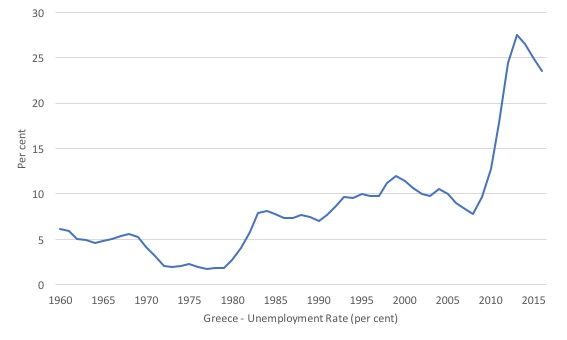
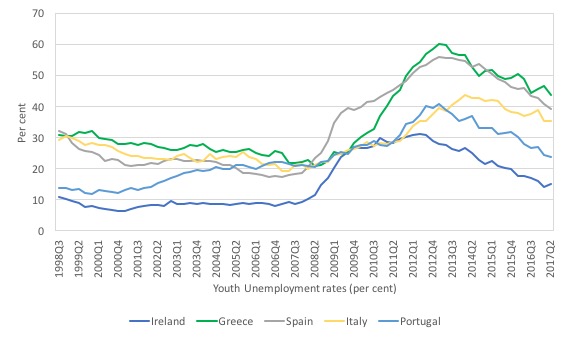
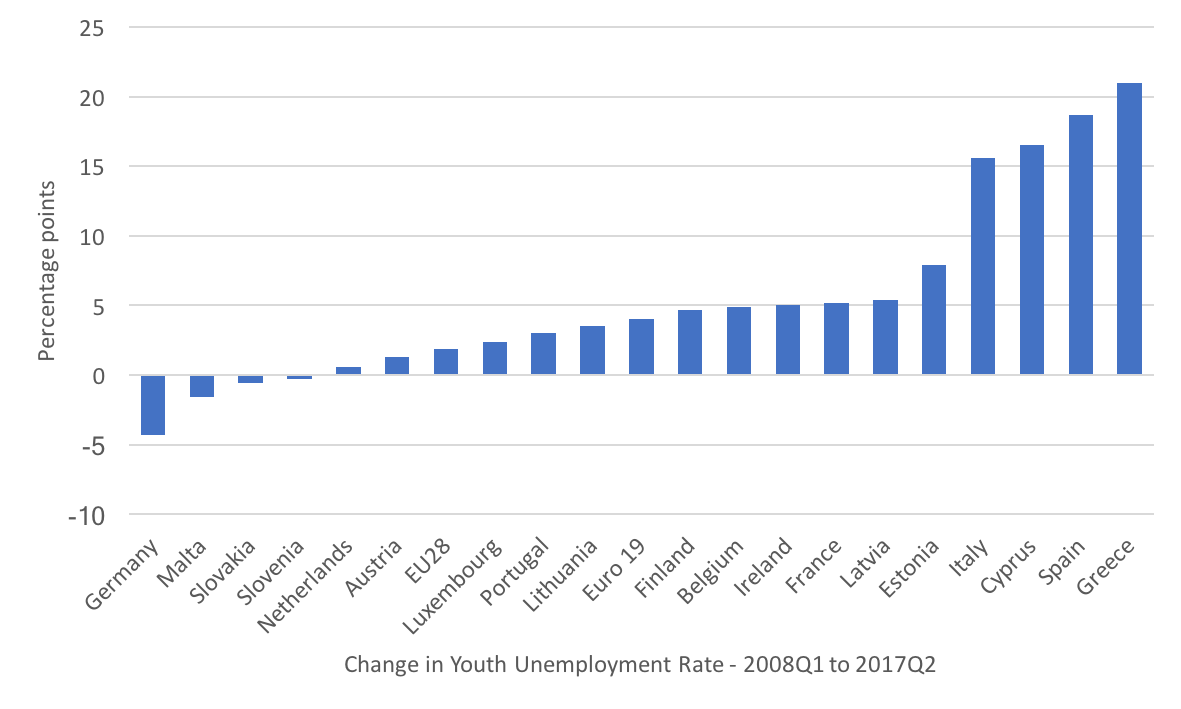
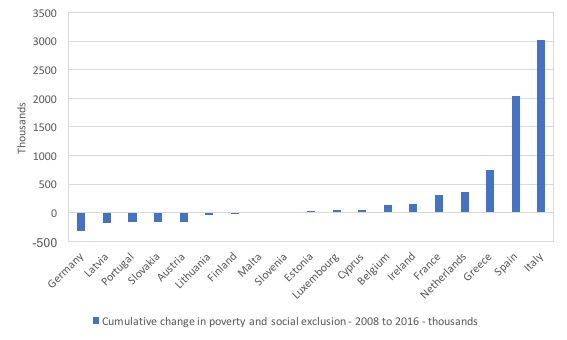
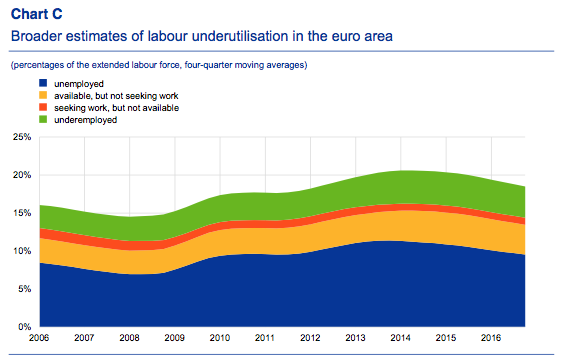
These people are EuroLiberals. Like the EuroDollar, they’re not really Liberal at all.
Dear Bill
To expect the left to be against the euro is like expecting the left to be against all immigration. Today’s left is reflexively anti-nationalist, and withdrawal from the euro is seen as a nationalist project, something that someone like Marine LePen advocates. If a country will withdraw from the Eurozone, it will not be dome by a leftist but by a rightwing populist party such as the Front National.
Regards. James
“If a country will withdraw from the Eurozone, it will not be dome by a leftist but by a rightwing populist party such as the Front National.”
Exactly right James. I am not waiting for the left to come along either.
Thanks Bill for the post.
You spoke of intergenerational disaster that is the massive youth unemployment. People never get employed and so never get fully integrated into society.
Let me share my case. I don’t know if what I am today is caused by my parents’ unemployment during my youth, my genes, or how I was brought up. It is probably all of the above.
Both my parents were largely unemployed for 15 years of my childhood. At one point, they became entrepreneurs to sell a software they wrote to garment companies, but that did not work out. They felt no dignity trying to rent out their program. At one point, they went bankrupt too. I was pretty much raised on welfare. I think this experience has made me very frugal. They argued quite a bit, but my parents have kept the family together. But, perhaps the social isolation they experienced also caused social isolation in me?
As an adult, I pretty much only spend money on politics/history/economics books (like Reclaming the State =]) and games. I wear and use stuff until they completely fall apart (holes are okay =)). That’s good for the environment, so it is not much of a negative there. The minor problem from that that is that being too frugal at work is a bad thing! I often refuse to order reagents to save money but slow our progress. In any case, the bigger personal problem is that I have trouble to have a sense of belonging to anywhere.
I constantly think that I am not good enough to worth anything (sometimes It can get debilitating). I don’t feel like i’m part of the society but a bug latching onto it. Come to think of it, I have NEVER felt that i’m a part of my community.
I have always felt that I am wasting other people’s times with my pressence. To be fair, people waste their time on all kinds of stupid stuff. However, I just have this irrational belief that I waste people’s time because I feel like I’m utterly worthless.
The other thing is the constant feeling of insecurity. I always try to save as much money as I can because I feel there is always a chance for things to go very bad and nobody can help me (which is kinda true in the US).
I am 27. My mother asked me why I don’t have a girlfriend. I just can’t feel connected to anyone. Professional relationships are great. Besides, I have NEVER seen a happy married couple. I have NEVER seen my parents really appreciate each other. I don’t want my child to face the problems I have or listen to his/her parents squabble or possibly be the unlucky one because someone has to lose when there are not enough bones to go around. Also, I don’t want to bring someone into the world when climate change is going to cause catastrophies.
Maybe some of you are like: Hey Tom, thats life. Stop whining. Get used to it.
Because I don’t want to sound whinny, I pretty much never share my feelings pretty much to anyone. Nor do I seek help for the same reason. I just let those negative thoughts tire my brain out and go to sleep for some time. When i’m not working I am almost always slightly unhappy. I don’t take photos because I don’t feel I am important enough for a picture. I am like the opposite of the millennial stereotype.
Having a good job now is slowly remediating me back to the society. I feel much more open to talking to other people and having friendships =). Those negative thoughts and feelings I stated above never go away though, and I suspect many people have it worse than I do. However, I think my experience point to the need for IMMEDIATE solutions to unemployment in West (9 years ago =(). There must be people who are more susceptible to the mental problems I have or have less support than I do, so some of them need good employment to get a sense of worth.
What a mistake the Eurozone has made in causing massive unemployment. Makes me tear up a little bit just to think about the misery in a place like Greece. To know that it is completely unnecessery suffering is just a massive tragedy.
Tom, you are a young man at 27. You have a lot of things going for you- you have a job for one thing, and a family that cares for you. Plus an interest in MMT :). Look- don’t forget this country went through 9 years of economic doldrums and worse just as you were becoming an adult.
Its ok to be frugal- just don’t be frugal with your health right now. Call up your doctor and tell him or her how you are feeling. You will feel much better about it and probably realize you are very normal.
What most gets me about the eurocrats or the europhiles is the massive projection wave that they-well- project.
You showcase their ruinous failures right before their eyes and they pretend that it’s just some massive conspiracy to reduce people’s faith in the project.
Always a conspiracy with that lot lurking around every corner, couldn’t possibly be their absolute failure to achieve anything that they promised.
Hi Jerry,
Thanks for the encouragement. I fare better than some of my friends. I am just thinking about the next generation. They are going to have it worse than me!
I need to get more involved in my community.
Hey Tom, just knowing that this misery is unnecessary gives me hope at least and a will to fight when I see a chance. Hard to understand how I survived when the incoherent mainstream narrative was all I could access.
Brendanm,
I think the internet has allowed important ideas to reach people. Back in my father’s generation, the only media was TV or print and so there was absolutely no way that alternative viewpoints could be presented.
Learning MMT is truly a eye-opening experience (mind-opening too). I gives me a lot of hope.
Bill,
You wrote:
“When is the Left going to work out that the basic constraint on any essential ‘reform’ (Germany) is not going to shift in the foreseeable future?”
and
“So I am sorry to say, that I still advocate exit.”
I am fully seized of the idea that many of the policies you propose would greatly benefit the majority of EU citizens. I also agree that Germany/the EU at present would probably not allow implementation of these policies.
However, even then, I am not sure if, given the chance, I would vote for EU/EUR exit.
The main constraints to implementing the policies advocated by MMT are not Germany or the EU, but the fact that there is that only a small minority of people who would actually support such policies, certainly in my country.
I’ve tried convincing colleagues, friends, family, even my local social-democrat MEP on one occasion, but I have not found any takers. There is a pretty solid consensus in favor of EU-style economic policy.
Also, I fear that EU/EUR exit, at least in my country, would lead to a massive reduction in living standards for the masses, as no party here seems to have any sensible economic policies to begin with.
J.
Unfortunately it is the affect heuristic.Not just the liberal centre but all the way to the marxist
left{workers of the world unite } there is an instinct for internationalism.
You have to win the economic arguments for monetary sovereignty against this natural grain.
A tough ask.
“If a country will withdraw from the Eurozone, it will not be dome by a leftist but by a rightwing populist party such as the Front National.”
James and Kristjan this is the issue that Bill is arguing against.
Too many on the left look at this through the lens of a dilemma: a xenophobic, reactionary nationalism versus a radical internationalism. (Implicit in this is that the EU/Eurozone is a “good” example of a transnational free trade agreement, whilst noting, of course, many might also criticise other “bad” free agreements). They do not seem capable of seeing that there are more than two alternatives and throw up their hands in horror at those arguing for the first horn, due to the fact that this is argued for by those on the right. However the problem is that they are then allowing the framing of this debate to be dictated by those on the right and stifling rational and empirical analysis and debate on the left about alternatives, they choose not to see anything else. Anyone arguing for any form of nationalism must be choosing the first horn, as they have framed it.
The argument that Bill makes is based on more than just asking the left to look at this as the horns of a different dilemma occupying the same space: a progressive, radical nationalism versus a reactionary, neoliberal internationalism. To swap one dilemma for another is a start but insufficient.
Bill is challenging the framing and I agree.